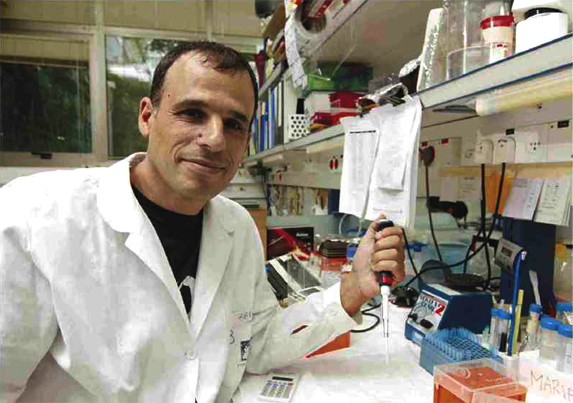
Prof. Atan Gross in his laboratory at the Weizmann Institute in Rehovot. Nir Keidor
Israeli researchers have identified a new mechanism for inducing the programmed death of cells, a discovery that could be used to develop novel methods for treating cancer.
The discovery began with the identification of a protein, mitochondrial carrier homolog 2, in human mitochondria. Mitochondria are the cells' "power plants," converting nutrients into the chemical energy required for the cell's ongoing operations.
The MTCH2 protein was discovered by Prof. Atan Gross of the Weizmann Institute's Department of Biological Regulation, and first published in the medical literature in 2005. About two years ago it was discovered that in the cell, the protein acts as receptor for a different protein, known as BID, which plays a significant role in postponing cell death.
Subsequent research by a team headed by Gross and Prof. Assaf Friedler of the Hebrew University of Jerusalem's Institute of Chemistry studied the interaction of these two proteins. Researchers found that while BID helps postpone cell death in the nucleus, it is essential for inducing apoptosis, or programmed cell death, in the mitochondria.
"This is an essential process that occurs in many mechanisms within the human body and involves many different types of proteins," Gross said, explaining that it is part of the body's defense mechanism against the spread of irregular cells. In practice, he explained, many cancerous cells are resistant to apoptosis.
According to the website of the Weizmann Institute, "If clinicians could regulate the production and activity of MTCH2, they would be able, for instance, to ‘turn on' mitochondria apoptosis in cancerous cells and turn it ‘off' in the brain cells of patients with Parkinson's and Alzheimer's diseases. Prof Gross's team is now working to further elucidate how BID induces apoptosis, and the exact role of mitochondria in the cell's ‘self-destruct' decision."
Molecular and biophysical studies of the binding interface between the two proteins led researchers to short protein strands called peptides, that induce cell death. In laboratory experiments these peptides caused the self-destruction of bone cancer (osteosarcoma) cells. Gross said the effect of these peptides can now be tested on other types of cancer cells.
The latest findings were published in a recent issue of the Journal of Biological Chemistry, in an article entitled, "Molecular Basis of the Interaction between Proapoptotic Truncated BID (tBID) Protein and Mitochondrial Carrier Homologue (MTCH2) Protein."
The next stage of the research will be to determine whether the cell-death mechanism affects only cancerous cells and to assess its effect on healthy cells, with the aim of going on to studies using mice and then to developing the commercial potential of the discovery.
